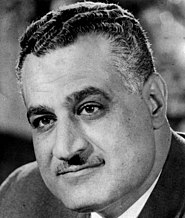Gamal Abdel Nasser
President of Egypt from 1956 to 1970 From Wikipedia, the free encyclopedia
Gamal Abdel Nasser Hussein[1] (15 January 1918 – 28 September 1970) was the second President of Egypt from 1956 until his death.[2] Along with Mohamed Naguib, the first President, he led the Egyptian Revolution of 1952 which overthrew the monarchy of Egypt and Sudan, and brought in a new period of change in Egypt.[3] This change made Egypt a more socialist and modern country. In 1954 the Muslim Brotherhood tried to kill Nasser.[2] He promoted pan-Arab nationalism, including a union with Syria that did not last very long.
Gamal Abdel Nasser Hussein جمال عبد الناصر حسين | |
|---|---|
 Portrait of Gamal Abdel Nasser | |
| 2nd President of Egypt 1st President of the United Arab Republic (UAR) | |
| In office 23 June 1956 – 28 September 1970 | |
| Vice President | Anwar Sadat(1969–1970) Ali Sabri(1965–1968) Zakaria Mohieddine(1961–1967) Hussein el-Shafei(1961–1965) Kamal el-Din Hussein(1961–1964) Abdel Hakim Amer(1958–1965) Abdel Latif Boghdadi (1958-1962) Akram al-Hawrani(1958–1960) |
| Preceded by | Mohamed Naguib |
| Succeeded by | Anwar Sadat |
| 2nd Secretary General of Non-Aligned Movement | |
| In office 5 October 1964 – 8 September 1970 | |
| Preceded by | Josip Broz Tito |
| Succeeded by | Kenneth Kaunda |
| 2nd Chairman of the Organization of African Unity | |
| In office 17 July 1964 – 21 October 1965 | |
| Preceded by | Haile Selassie |
| Succeeded by | Kwame Nkrumah |
| Prime Minister of United Arab Republic | |
| In office 1 February 1958 – 29 September 1962 | |
| Succeeded by | Ali Sabri |
| Prime Minister of Egypt | |
| In office 18 April 1954 – 1 February 1958 | |
| Preceded by | Muhammad Naguib |
| Vice Chairman of the Egyptian Revolutionary Command Council (RCC) | |
| In office 23 July 1952 – 23 June 1954 | |
| Personal details | |
| Born | 15 January 1918 Alexandria, Egypt |
| Died | 28 September 1970 (aged 52) Cairo, Egypt |
| Nationality | Egyptian |
| Political party | Arab Socialist Union |
| Spouse(s) | Tahia Kazem |
| Children | Hoda Abdel Nasser Mona Abdel Nasser Khalid Abdel Nasser (deceased) Abdel Hamid Abdel Nasser Abdel Hakim Abdel Nasser |
| Occupation | Military instructor |
| Military service | |
| Branch/service | Egyptian Army |
| Years of service | 1938–1952 |
| Rank | Colonel |
| Battles/wars | 1948 Arab-Israeli War |
Nasser is seen as one of the most important political figures in modern Arab history and politics. Under his leadership, Egypt nationalized the Suez Canal and other industries. He also became important in stopping imperialism in the Arab World and Africa. He was also important in starting the Non-Aligned Movement. Nasser's version of pan-Arabism, which is often called "Nasserism", was very popular in the Arab world during the 1950s and 1960s.[4] Even after the Israeli victory over the Arab armies in the Six-Day War damaged the way the public saw him, many Arabs still view Nasser as a symbol of Arab dignity and freedom.
References
Wikiwand - on
Seamless Wikipedia browsing. On steroids.
